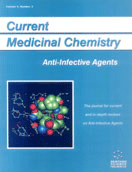Abstract
Malaria remains the first world-wide parasitic disease with an estimated 2.7 million deaths per year, most of them occurring in Africa. The parasite, Plasmodium falciparum, has demonstrated its extreme skill at adapting to all drugs currently in use (like chloroquine (CQ)) and resistance to these drugs has spread almost all over the world. Therefore (multi)drug resistance has become one of the most important problems. Whereas the discovery of an antimalarial compound with no possibility of resistance seems utopian, new strategies have been developed to overcome the situation. The most promising results come from the new area of bioorganometallic chemistry with the synthetic compound Ferroquine (FQ). In vitro, FQ inhibits at nanomolar concentrations the growth of chloroquino-resistant strains and isolates P. falciparum. Its schizontocidal activity was confirmed in murine models. Chemical modifications of FQ were attempted to correlate structure with activity. Some physicochemical properties of FQ were investigated to elucidate its mechanism of action. This strategy, based on incorporation of an organometallic moiety into the “standard” drug, offers new possibilities in reversal of resistance and therapeutic application. The review will conclude by presenting the present industrial development of FQ.
Keywords: malaria, plasmodium falciparum, chloroquine resistance, ferroquine, bioorganometallic chemistry
 4
4

